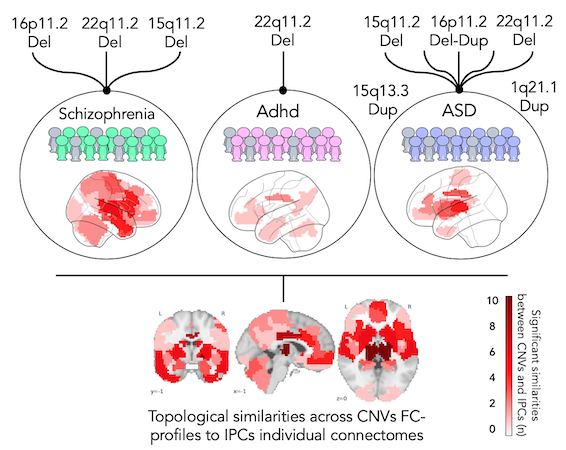There is currently a widening gap between the tidal wave of gene discovery in neuropsychiatric conditions and our poor understanding of rare genomic variants' effects on cognitive, behavioral, and neuroimaging traits. Deleterious Single Nucleotide Variants (SNVs) and Copy Number Variants (CNVs) are identified in 5 to 40% of individuals with neuropsychiatric disorders. Still, little is known on how they confer risk to these conditions.
The lab is focussed on the growing need for large-scale, systematic, structured, and quantitative phenotypic and genomic research in rare genomic variants.
We work with data collected by our group as well as collaborators, in individuals who carry specific high-risk factors for psychiatric conditions such as the 16p11.2, 1q21.1, 15q13.3.
We also investigate genome-wide, the effects of rare recurrent and non-recurrent CNVs and SNVs on cognition and brain architecture.
Projects
Rare genomic variants, brain structure, and functional connectivity
We are investigating the effects of CNVs on neuroanatomical traits such a cortical surface and thickness as well as resting-state fMRI. We are analyzing data from large international cohorts as well as neuroimaging data collected by our lab on individuals who carry rare genomic variants. Our goal is to understand how genomic variants that affect specific biological processes modulate brain architecture.
CNVs, SNVs, and their impact on cognition and risk for autism
We are using rare variants to map the effects of biological processes on cognition, behavior, and risk for psychiatric conditions. We developed MIND·CNV - which is a online tool created to help clinicians and researchers estimate the effect size of CNVs on cognitive ability and risk for autism.
Randomized control trial of metformin in fragile X syndrome.
We are assessing the efficacy of metformin in individuals with Fragile X Syndrome.
In particular, effects on language and behavioral outcomes.
Clinical trial link
TACC & Q1K family cohort
The Transforming Autism Care Consortium (TACC) is a research network that connects and mobilizes Quebec’s strengths in autism research. Our main project is the Quebec 1000 families cohort (Q1k) gathering cognitive, behavioral, eye tracking, EEG, and neuroimaging data on 1000 families.
Selected Publications
Measuring and Estimating the Effect Sizes of Copy Number Variants on General Intelligence in Community-Based Samples
Jama Psychiatry 2018
Effect sizes on IQ of most deletions can be reliably estimated by models using haploinsufficiency scores.
Neuropsychiatric mutations delineate functional brain connectivity dimensions contributing to autism and schizophrenia
Nature Communications
16p11.2 and 22q11.2 Copy Number Variants may represent mechanistic building blocks shared across idiopathic conditions.
Differential effects of deletions and duplications on autism risk across the genome
American Journal of Psychiatry
Autism risk conferred by duplications is less influenced by IQ compared to deletions. CNVs increase autism risk similarly in individuals with high and low IQ.
Team
Principal Investigator and Geneticist

Sebastien Jacquemont
Principal Investigator - GeneticistResearch Team

Guillaume Huguet
Research associate
Charles-Olivier Martin
Research coordinator
Laura Peyras
Lab manager
Marine Lardennois
Administrative assistant
Martineau Jean-Louis
Bioinformticist
Zohra Saci
Bioinformticist
Marylin Koayes
Genetic counselor
Khadijé Jizi
Genetic counselor
Anne-Marie Bélanger
Research Assistant
Valérie Fontaine
Research AssistantPost-doc

Kuldeep Kumar
Postdoc - Neuroimaging
Jakub Kopal
PostdocDoc Students

Elise Douard
Phd Candidate (2016)
Thomas Renne
Phd Candidate (2021)
Cécile Poulain
Phd Candidate (2021)
Sayeh Kazem
Phd Candidate (2021) Co-supervised
Rackeb Tesfaye
Phd Candidate (2017) Co-supervisedMaster Students

Nadine Younis
Master student
Annabelle Harvey
Master student
Catherine Proulx
Master student
Andréanne Proulx
Master studentTrainees

Jade England
Medical Genetics M.ScAlumni

Sandra Martin-Brevet
PhD (2019) Neuroscience
Claudia Modenato
Phd Candidate (2016)
Clara Moreau
Postdoc - Neuroimaging
Petra Tamer
M.Sc
Elise Barbeau
Postdoc
Aia E. Jonch
Phd (2019) Geneticist
Catherine Schramm
Postdoc (2019) StatisticsCollaboration

Mor Absa Loum
Assistant ProfessorCNV prediction
This tool was created to help clinicians estimate the potential impact of deletions in the genome (hg19 genomic map) on cognition based on the results of Huguet et al. (JAMA psychiatry 2018).
Try out our tools!







